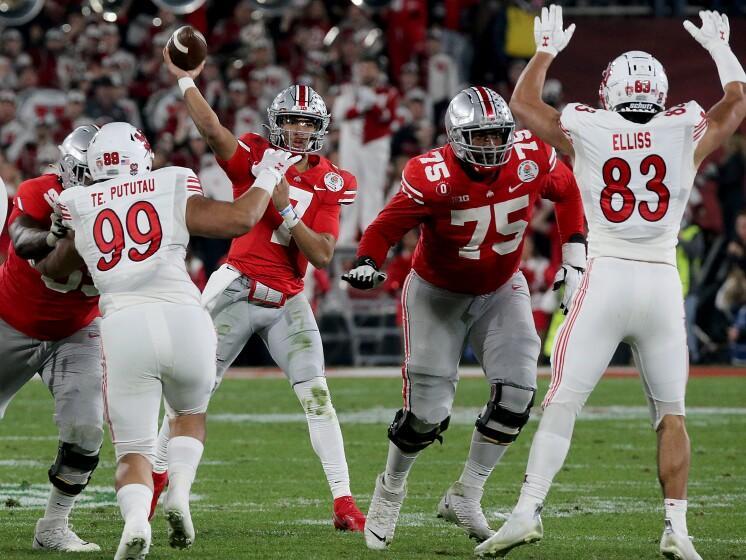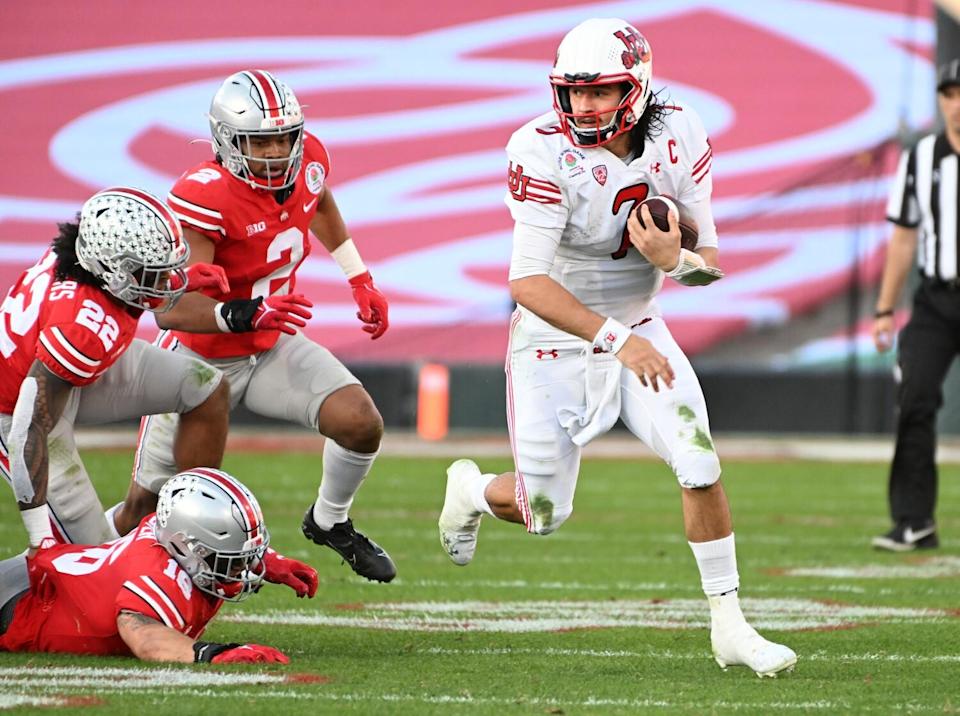
After three hours of hair-raising excitement, stunned silence. The Utah quarterback, Southern California’s own Cameron Rising, lay flat on his back, surrounded by team physicians. Heads bowed all over the Rose Bowl, where 90,000 people draped in varying shades of red hoped for the young man’s good health and the continuation of their nonstop adrenaline rush.
And luckily it would not stop for anything in Pasadena on this first day of 2022, a day that began with the voice of college football questioning the very fiber of the players who like Rising have put their bodies and futures on the line for the last four months.
“I think this era of player just doesn’t love football,” Kirk Herbstreit had lamented Saturday morning on ESPN’s College GameDay, sitting on the same hallowed ground where Ohio State’s Kourt Williams would plunge Rising’s shoulder and head into the turf with a game-changing sack.
This 108th Rose Bowl had served as a heartfelt response from the Utes of the Pac-12 and the Buckeyes of the Big Ten on behalf of their brethren across the country: Hey, we care. An unthinkable kickoff return for a touchdown by Utah’s ageless Britain Covey said it. Record-setting Rose Bowl performances by Ohio State quarterback CJ Stroud and wide receiver Jaxon Smith-Njigba confirmed it. The guts that would be spilled in the closing moments to come would etch it into stone.
The game, now tied at 38, may have been an exhibition, but it had been proven far from meaningless. Rising would walk off the field on his own power, bringing a collective exhale. Ohio State would soon take its first lead of the game as Stroud, the Rancho Cucamonga product, dropped another precise pass into the waiting hands of Smith-Njigba, whose feet somehow did the rest, dancing just inside of the edge of the grass painted snow white for his third touchdown.
“The throw and the catch there is probably as good as I’ve ever seen in a big-time spot,” Ohio State coach Ryan Day said.
The ball came back to Utah, which trotted out a freshman walk-on named Bryson Barnes for a second series in relief of Rising. He had not thrown a pass all season, and yet the kid would be asked to meet this moment with the sun having already set behind the San Gabriels in the “Granddaddy of Them All.”
[embedded content]
Of course Barnes would rise to the occasion, floating a 15-yard touchdown pass to tight end Dalton Kincaid to tie it and tease a rapt college football world with the prospect of overtime.
But the exhausted Utes could not muster the rare defensive stop against Stroud, who would finish the day with 573 passing yards and six touchdowns, and a Rose Bowl classic would end quietly with a chip-shot 19-yard field goal by Ohio State’s Noah Ruggles with nine seconds left.
No. 6 Ohio State, the team that alum Herbstreit had questioned Saturday morning, outlasted No. 11 Utah 48-45, coming back from four 14-point first-half deficits. The Buckeyes displayed a will befitting of the Big Ten’s dominant program, finding a way to win despite playing without a reported 24 scholarship players.
“I’m really proud of my guys for staying calm and not really panicking, not pointing fingers or anything like that,” Stroud said. “We all kind of stayed even keel.”
Day admitted during the week that the Buckeyes were still stinging from their 42-27 season-ending defeat to rival Michigan. He would not reveal what was said at halftime with his team trailing Utah 35-21.
“I’ll leave that for the locker room,” Day said. “There’s some things that I probably can’t repeat, but that’s OK, that’s how football goes.”
Herbstreit’s critique of the modern college football player was prompted by the decisions of numerous Buckeyes, including star wide receivers Garrett Wilson and Chris Olave, to opt out of playing on one of the nation’s most venerable sporting stages to protect themselves from injury before April’s NFL Draft. This is not a new trend at this point, but Herbstreit was riled.
“Saying these games were meaningless, I just don’t understand,” Herbstreit said. “If you don’t make it to the playoff, how is it meaningless to play football and compete? Isn’t that what we do as football players? We compete. I don’t know if changing or expanding [the playoff] is going to change anything. I really don’t.”


Herbstreit struck a chord with on-set colleague Desmond Howard.
“That’s what I’m about to say,” agreed Howard, the 1991 Heisman Trophy winner at Michigan who himself starred in the Rose Bowl. “We’re dealing with a totally different mentality. … They have a sense of entitlement. If we’re not going to the one that matters, it just doesn’t have as much value to them as it did for us growing up.”
In this way, no bowl has lost more in the four-team playoff era than the Rose, which has had to routinely fight to maintain its place in the sport’s hierarchy. Most years, at least one of the Big Ten or Pac-12 champions are in the playoff, which means the game can feel more like a consolation prize for a team that had dreams of a national championship.
That was the place Ohio State found itself after losing to Michigan for the first time in a decade. Olave, a Mission Hills product, had returned for his senior season with the goal of winning the big prize, passing up a year of an NFL salary. That was all lost on Nov. 27 in Ann Arbor. Olave’s decision to sit out the Rose Bowl was hardly controversial.
And, if Olave and Wilson hadn’t sat, the millions watching at home would have been deprived of Smith-Njigba’s virtuoso performance, as the sophomore set a new all-time record for receiving yards in a bowl game with 347 spread over 15 catches.
Herbstreit was on the color commentary for ESPN’s broadcast and spent the entire second half sounding amazed at the effort he was watching. Maybe today’s player isn’t so different, after all?
“This is the Rose Bowl, man,” Stroud said. “This is where the legendary games are being played. If you aren’t motivated to play, I question your love of the game.”
This story originally appeared in Los Angeles Times.
